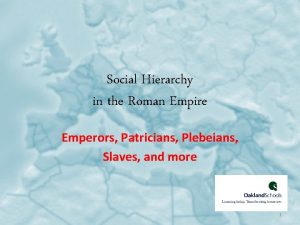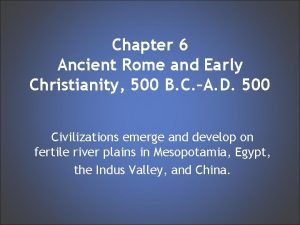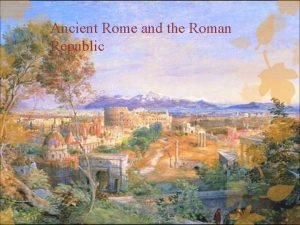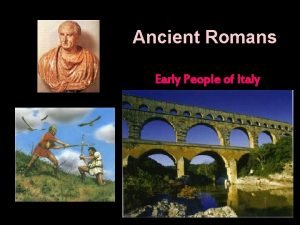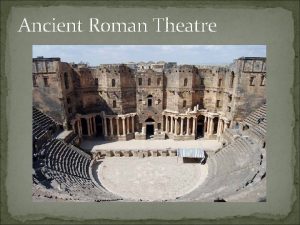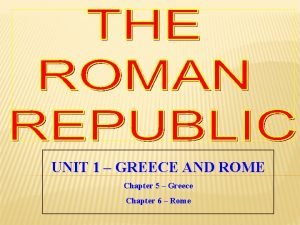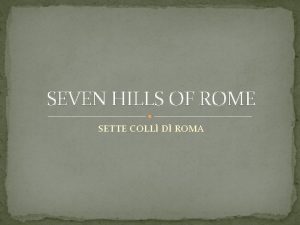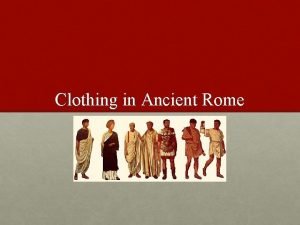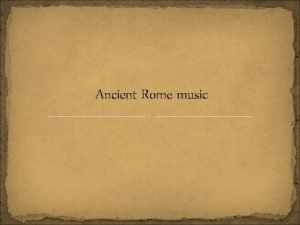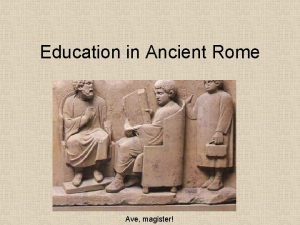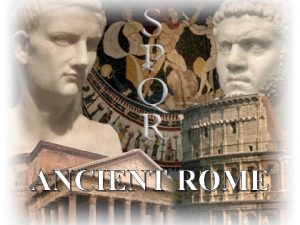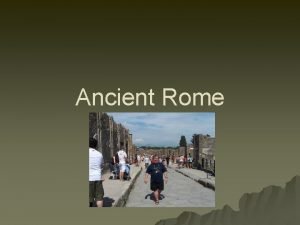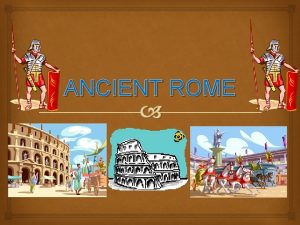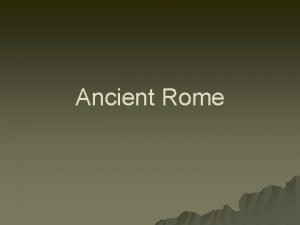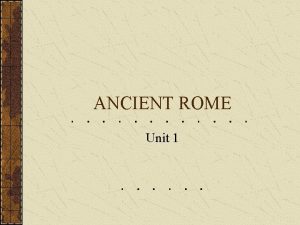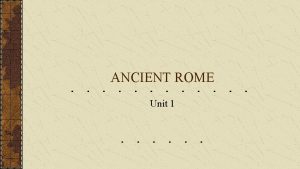Education in Ancient Rome Ave magister Overview of















- Slides: 15

Education in Ancient Rome Ave, magister!

Overview of Roman Education • Early Republic (750 -350 BC) • • Domestic education by parents, esp. paterfamilias Agricultural, domestic, moral, & civil skills, for both boys/girls No strong national literature Spurius Carvilius = first fee-paying “ludus” • Late Republic (300 -0 BC) • Emergence of more formal, tiered schools, by ability > age • Greek influence strengthens w/ private tutors, literature, higher ed. • Yet Roman reject Greek music, athletics in favor of oratory, law, and “practical” skills • Empire • Abundance of private schools • More international student body I didn’t learn geometry and literary criticism and useless nonsense like that. I learned how to read the letters on public inscriptions. I learned how to divide things into hundreds and work out percentages and I know weights, measures and currency. -Petronius, Satyricon, 58

Types of schools • Primary School (w/ litterator or magister ludi) • • • Secondary School (w/ grammaticus) • • Reading w/ simple letters, phrases from texts & inscriptions Writing w/ erasable wax tablet & stylus (CAPS only) Simple math w/ abacus or pebbles (and Roman numerals) Low fees, open to any student, mixed social classes Writing w/ parchment & quills for advanced students Latin & Greek for elite students Oratory, beg. rhetoric, poetry, grammar = civic/political training Oratory School/”College” (w/ rhetor) • More advanced rhetoric; typically noble students

School Life • Academic Year • Began March 24 (Feast of Minerva) • 7 days/week, but many holidays (e. g. , Quinquatria (Mar. 19 -24) • Sunrise start, followed by lunch/siesta & classes • Corporal Punishment common • Knuckles, ears, hair, posterior all fair targets • Horace referred to his teacher Oribilus as a “plagosus” (thrasher!) • Pedagogy • Oral emphasis (dictation, lecture, disputation) • Memorization and recitation, enunciation • Quaestiones (abstract concepts) vs. causae (specific situations) vs. declamatio (advocacy of action) • No systematic study or curriculum until 1 st c. BC

Roman tools for school

Roman Writing Tablets

Roman Abacus

School Life II • Paedagogus (“child leader”) • Family slave (often Greek) who accompanied boy to/from school, provided tutoring & safety • School Buildings • Rarely purpose-built buildings • Rough, backless benches • Apprenticeships for older students • Vital for students to network, and to gain experience in diplomacy, military tactics


Famous Roman Teachers • Cicero (103 BC-43 BC) • Roman statesman, orator, lawyer, political scientist, & prose stylist • Sent his son Marcus to Athens to complete his education, as many wealthy families did (=Grand Tour) • Quintilian (35 -100 AD) • Marcus Fabius Quintilianus • Trained in Rome—lawyer in Spain--assistant to Emperor Galba—opens a school of Rhetoric in Rome. • Tutor to Domitian’s grand-nephews • Author of Istitutio Oratorio, on technical points of speech and training of orators—

Plutarch on Cato the Elder • …And when the child was old enough to read, Cato himself took charge and taught him to read and write, even though he owned an accomplished slave …who was a teacher and had instructed many boys. But Cato did not think it proper for his son to be criticized by a slave or to have his ears tweaked by a slave when he was a slow learner, or to owe to a slave so precious a gift as his education. Therefore, Cato was his reading teacher, his law professor, his athletic coach. …He also says that he wrote his book in large letters so that his son might have the opportunity at home to become familiar with his society’s ancient customs and traditions. He was careful to avoid indecent language in his son’s presence.

Juvenal’s Satires on teacher’s salary • What grammaticus …ever receives the salary which his hard work deserves? And then this amount, however small ( certainly less than a rhetor earns) is further diminished by bribes to greedy paedogogues and fees to accountants…. resign yourself. As long as you get some money for sitting in a classroom in the middle of the night when no laborer or woolworker would be on the job! As long as you get some money for enduring the stink of oil lamps ( olive oil)…and yet rarely do you get your money without a court case. But still the parents set impossible standards for you. You must know the rules of grammar perfectly, memorize history books and. . Then the parents say, "Do your job well, and when the end of the year comes, we’ll pay you for the twelve month period the same amount that a chariot driver earns in one race.

Roman Education

Lector emptor!

Additional Resources • • See our Wiki See Ancient History Sourcebook See printed books on the desk See Think. Quest and Wikipedia
 School of litterator
School of litterator Ave magister
Ave magister Empieza por a y no es ave sin ser ave vuela quién será
Empieza por a y no es ave sin ser ave vuela quién será Ancient greece physical education
Ancient greece physical education Roman empire class structure
Roman empire class structure Dowry ancient rome
Dowry ancient rome Google earth ancient rome
Google earth ancient rome Ancient rome and early christianity chapter 6
Ancient rome and early christianity chapter 6 Romes geography
Romes geography The etruscans lived in the area known as _____.
The etruscans lived in the area known as _____. Ancient roman plays
Ancient roman plays Ancient rome tiber river
Ancient rome tiber river Seven hill roma
Seven hill roma Ancient roman children's clothing
Ancient roman children's clothing Ancient roman dance
Ancient roman dance Ancient rome jeopardy
Ancient rome jeopardy




